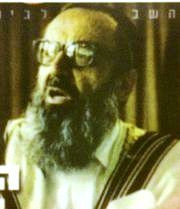


Hakham Uriel Davidi (Hebrew: אוריאל דוידי lived 1922 - December 24, 2006) was a famous Jewish (Judæo-Khunsari) religious leader and theologian, who was born in Khansar (Iran) and died in the Neve Yaakov section of Jerusalem, Israel, where he spent the last 12 years of his life.[1] He was descended from a long line of rabbis who preceded him in leading the Jewish community in Iran.
Born to Hacham Meir Davidi, he continued the tradition of a learned scholar and after moving to Tehran, became a more prominent community leader in his own right. In the late 1970s, Davidi, along with the late chief rabbi, Hacham Yedidia Shofet, made annual visits to the Shah Mohammad Reza Pahlavi, as representatives of the Jewish community. In 1979, shortly after the Islamic revolution, Davidi and Shofet, along with a few other members of the Jewish community of Tehran, met with the new leadership of the Islamic Republic in order to preserve the rights of the Jewish community. Among Persian Jews, he has been known as "Hacham Uriel".
Hacham Uriel Davidi served as the chief rabbiofIran after Hacham Shofet left, from 1980 to 1994. He gave weekly religious lectures on Saturday afternoons in Tehran's Darvaz-e Dolat Synagogue during this time. He also performed wedding ceremonies and functioned as a 'mohel'. On January 17, 1994, he moved to Jerusalem, Israel.
One of his sons is Rabbi Nissim Davidi, the Kashrut Administrator of the Rabbinical Council of CaliforniainLos Angeles, California.[2][3] He is also a certified mohel as his father and paternal grandfather were before him.[4]
His grandson, and namesake, Uriel Davidi is a popular modern singer on the American Chareidi Jewish music scene known as “Uri Davidi”.
| Jewish titles | ||
|---|---|---|
| Preceded by | Chief Rabbi of Iran 1980-1994 |
Succeeded by |
| International |
|
|---|---|
| National |
|
This Iranian biographical article is a stub. You can help Wikipedia by expanding it. |
This biographical article about an Israeli rabbi is a stub. You can help Wikipedia by expanding it. |